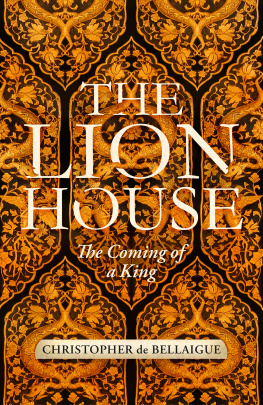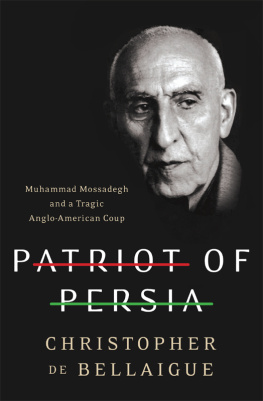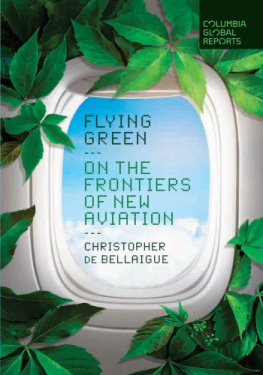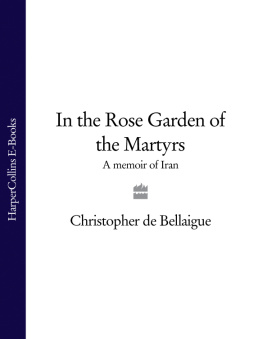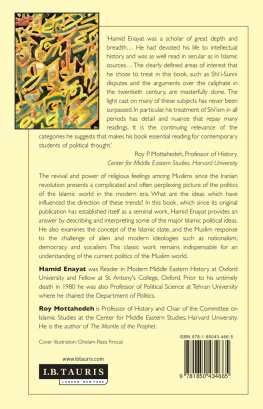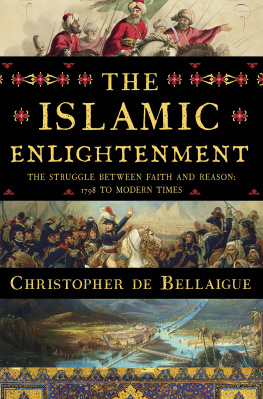
The Islamic Enlightenment
The Struggle Between
Faith and Reason
1798 TO MODERN TIMES
CHRISTOPHER DE
BELLAIGUE

LIVERIGHT PUBLISHING CORPORATION
A Division of W. W. Norton & Company
Independent Publishers Since 1923
New York London
Also by Christopher de Bellaigue
Patriot of Persia
Rebel Land
In the Rose Garden of the Martyrs
The Struggle for Iran
At Lowood School for girls, in the reign of King George III of England, an ill-used, orphaned teacher called Jane Eyre lies abed thinking about her future.
I have served here eight years; now all I want is to serve elsewhere. Can I not get so much of my own will? Is not the thing feasible? Yes yes the end is not so difficult; if only I had brain active enough to ferret out the means of attaining it.
I sat up in bed by way of arousing this sad brain: it was a chilly night; I covered my shoulders with a shawl, and then I proceeded to think again with all my might.
What do I want? A new place, in a new house, amongst new faces, under new circumstances... How do people do to get a new place? They apply to friends, I suppose: I have no friends. There are many others who have no friends, who must look for themselves and be their own helpers; and what is their resource?
I could not tell: nothing answered me; I then ordered my brain to find a response, and quickly... as I lay down it came quietly and naturally to my mind: Those who want situations advertise; you must advertise in the shire Herald.
How? I know nothing about advertising.
Replies rose smooth and prompt now:
You must inclose the advertisement and the money to pay for it under a cover directed to the Editor of the Herald; you must put it, the first opportunity you have, into the post at Lowton; answers must be addressed to J. E. at the post-office there: you can go and inquire in about a week after you send the letter, if any are come, and act accordingly.
This sleepless hour is the corner that Jane Eyre turns in order to fall into the arms of Mr Rochester, for her decision to place an advertisement in the county newspaper will lead to her moving many miles from Lowood and taking up a new position, as governess of Mr Rochesters ward at Thornfield Hall. The passage here determines the path that a much loved novel will follow, and yet it is possible to think of it in a bigger, socially more significant way: as an avenue into a new world.
Janes urges need no introduction: variety and movement are what she seeks, and the education she has received is her means of achieving it, for the instruction she has received at one of a burgeoning number of English girls schools has not only lent purpose to an excellent mind, but also raised her above any sense of inadequacy. Jane is independent of spirit and this will allow her to be independent of means. Jane Eyre is modern.
Her modernity extends to the rational way she sees the world and her place in it. Jane is a Christian but in her hour of indecision she does not finger a wooden cross or leverage the Gospels far less seek signs in the stars. Faith guides and gives her strength in the moral and emotional crises of her life; however, in times of functional dilemma when she is in search of the clear practical form that will set her fluttering brain to rest Jane interrogates not God but Jane.
And yet, for Jane to see her scheme to its conclusion, she needs the help of certain features of modern England. Without the provincial newspaper, the post office and finally, when it comes to making the journey to Thornfield Hall, a wheeled conveyance trundling along one of the turnpike roads, safe enough for a woman to take on her own, she will be able to do nothing.
Perhaps more important than any of these things, Jane will need society to agree that she is sovereign over her own destiny an unmarried woman free to climb aboard a post-chaise and go wherever she pleases, at no risk to her reputation.
Now I want to take up this picture of Georgian England and put it into a quite different setting. Imagine that the Jane Eyre of Charlotte Bronts novel has been transposed to a non-European situation. By the standards of nineteenth-century globalisation this new environment is not very distant to get there merely involves crossing the Mediterranean. There one meets the close sibling of the Judaeo-Christian world inhabited by Jane, a civilisation built on the third and most recent of the Hebraic monotheisms and influenced by Greek patterns of thought.
This is the civilisation of Islam. How would this civilisation have dealt with Jane Eyre and the vistas of personal fulfilment preventing her from closing her eyes at night? Would it approve or wrinkle its nose? Would Islam get Jane Eyre?
Were I able to answer this question in the affirmative, it is likely that you would not be holding this book, or you would be holding a very different book. Islamic civilisation in the first decades of the nineteenth century would neither have appreciated nor understood Jane Eyre, because it hadnt the wherewithal to do so.
First consider the vehicle by which Muslim audiences would have met her: the printed book. This would have been a non-starter at the time in which Jane Eyre is set, because almost four centuries after Gutenberg revolutionised intellectual and religious life in Europe with the invention of movable type, the printing press continued to be regarded by Islam as an unwelcome and alien innovation, and had not been admitted to general use. Then there was the matter of translating Bronts prose into the local languages. The number of Turkish, Arabic and Persian speakers who knew good English was minuscule and there was no market in the Middle East for translated works from abroad.
Even if these constraints had been somehow overcome, and the trusty copyists were induced to inscribe large quantities of a translated Jane Eyre, audiences would have remained tiny for another reason. The latest scholarship puts the literacy rate in Turkey, Egypt and Iran the three most important intellectual and political points in the region at roughly 3 per cent at the turn of the nineteenth century, compared to more than 68 per cent for men and 43 per cent for women in England. In Amsterdam, the worlds capital of literacy at the time, the figures were 85 per cent and 64 per cent respectively. There can be no reading public when no one can read.
Still, ploughing doggedly on, supposing we could wave aside these considerations and imagine that through public storytellers large numbers of Muslims were exposed to the life and times of Jane Eyre, what would their reaction have been? The notion of newspapers and a postal service would have caused bemusement in lands where neither existed, no less than the fantasy of wheeled traffic between towns. Then there was the moral Pandoras box opened by Janes behaviour. It was scandalous that a heroine should gad about the country without a chaperone, fall in love with one man, attract the attentions of another and after this wanton display be presented by the author as a model of virtue.
The very systems of society were completely different in Janes England: where was the harem, the protected, female-only sanctum within the family, and why did Mr Rochester not have slaves? And dont even mention Mr Rochesters dissipated female guests at Thornfield Hall, playing airs on the fortepiano and riding horses and showing off their bosom and long flowing hair.
Next page

